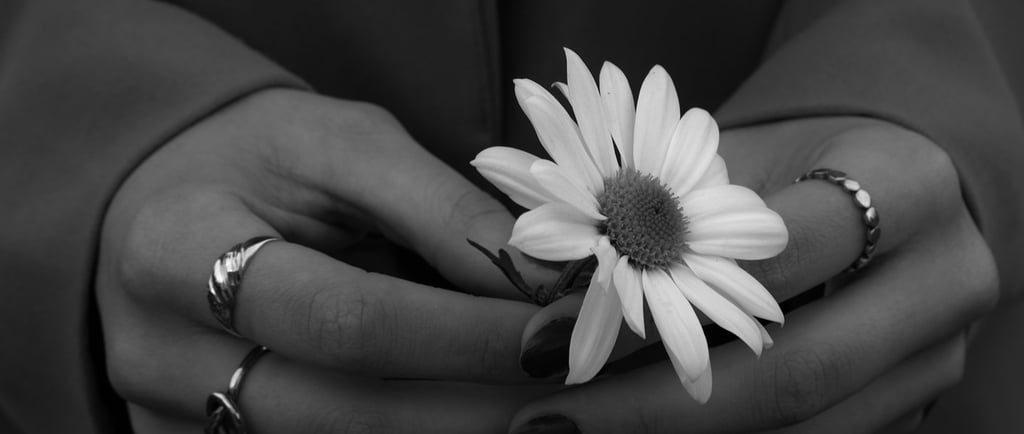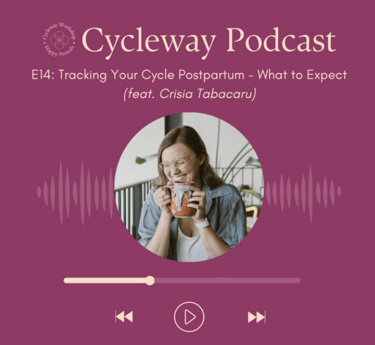
Navigating Your Cycle After Loss: Hormones, Grief, & Healing Your Fertility
Confused about your cycle after miscarriage, stillbirth, or infant loss? Get answers on when your period will return, why irregularity happens, and how to holistically heal your hormones for future fertility.
Caroline Bomer
10/18/20256 min read


"I'm sure you have some crazy mixed feelings about the return of your cycle?" That's what one of you said when I shared that I got my first period postpartum, and if you've experienced loss, I'm guessing you can relate.
Cycles can be confusing for anyone, but cycles after pregnancy & loss are the most complicated- logistically and emotionally. For many, there's a weird tension between wanting to get it back soon and being fertile again, but also hoping you can just get a break and not think about your uterus for a while. It's a mess of hormone changes, grief, healing, postpartum, and big decisions.
So with my cycle's return, I figured it was time to unpack what's going on with your hormones, cycle, and period after loss.
START HERE:
"When will I get my period back after my miscarriage, stillbirth, or infant loss?"
No matter when you experienced loss, you still go through postpartum. The longer you were pregnant, the longer it will likely take to recover and return to normal. It could be right away, or it could be several months. Both can be normal and there's a lot of gray area, which is where intuition comes into play. If you feel like something is off, listen to that.
Other influences include how you feel about your cycle, if you want to TTC soon, if your body is clearing out excess toxins or iron (possibly from an infusion), how well nourished you were before & now, how you're processing grief, physical or emotional trauma, the time of year, and other factors. Our bodies are amazing at adapting to our environment and needs.
Some women find that they don't get their cycle back until they pass the "due date" of their pregnancy. While anecdotal, this is a common experience that I think is a beautiful way your body may be holding space for that baby, giving you time to process and grieve before moving on.
"My cycles are irregular now after I lost my baby. Should I be worried?"
Totally normal, especially if you experienced a loss later in pregnancy. For one, your cycle can take some time to re-regulate your hormones as you transition from pregnancy to ovulating again. Second, per German New Medicine, the ovaries (which govern ovulation), are tied to a "loss" conflict. In other words, the ovaries will change as they heal and account for the loss experienced, which can result in cysts, irregular cycles, and a diagnosis of PCOS.
Ideally, things should re-regulate after a few cycles. You can use the free Period Checklist to analyze your cycle and what a healthy cycle looks like. I recommend referencing this often as you observe your body during this time.
"How do I chart my cycle after pregnancy?"
Speaking of observing your cycle, let's talk charting- YES you can absolutely chart your cycles, even if you haven't gotten your period back, even if it's irregular. I recommend starting with a method that helps predict ovulation, like cervical mucus patterns, LH/ovulation strips, or testing estrogen, then confirming ovulation with that rise in BBT. Get the Cycle Charting Cheat Sheet to start charting with ease and total data privacy.
(Bonus: all these signs can give you a great deal of insight into your healing and hormonal health too!)
**cycle charting may be too triggering for some, especially after multiple losses. The goal is to heal, and if cycle charting is doing more harm than good, take a break if needed.
"What's going on with my hormones after pregnancy loss?"
During pregnancy, your hormones all rise significantly. After miscarriage, hormone levels may remain elevated for a short time. In any case, your hormones drop from their highest point to the lowest after birth (including miscarriage). This hormone drop is a natural part of the process and is nothing to fear.
Until you ovulate again, you're in an extended follicular phase. Estrogen will rise again, helping the egg follicles mature and prepare to release an egg (ovulation). You may notice you get a bleed before ovulating again- also normal! This means estrogen is rising enough to build up the uterine lining, but not quite enough to trigger ovulation. If you have little to no cervical mucus, that's a key sign that estrogen is low, so you may not get a period for a while or ovulate soon.
PRO TIP: charting your cervical mucus is the easiest way to see if estrogen levels are rising. It's normal to have shorter Luteal phases for a little while too (more so with a later loss), meaning progesterone is lower.
LISTEN NOW: Postpartum Cycle Tracking - What to Expect (feat. Dr. Crisia Tabaracu)
Dive in deeper to postpartum cycles. While we didn't discuss loss specifically, many of the same principles still apply. Learn what's really going on with your hormones after pregnancy, what's truly normal for postpartum cycles, and how to still chart your cycle accurately.
MY EXPERIENCE
For me personally, I experienced loss on both ends of the spectrum- 2 miscarriages at 18 DPO (days past ovulation, or 5 1/2 weeks), and then with my newborn son born at 41 weeks. Unsurprisingly, my cycles after all of these losses were vastly different.
Miscarriage 1:
My cycle returned to normal, although I started ovulating 3-4 days earlier than I had before, on Day 14 instead of 17 or 18. Not surprising since I understood enough of GNM to know this loss would affect my ovaries. Now my body was adapting to ovulate earlier, giving me a sooner opportunity to conceive again. Amazing.
Miscarriage 2:
This was also during an extremely stressful month, so my body was depleted and exhausted. I skipped ovulation the next cycle, which I was actually grateful for because I knew I needed to give myself some time to replenish and recover before conceiving again- and my body was on the same page. The next two cycles returned to normal, with a nice, long Luteal phase and healthy periods.
After Newborn Loss:
My body was fully ready to care for a baby. (Even nearly 3 months later, I'm still leaking milk), so this has been the biggest shift. I could see reasons I'd get my cycle back soon, but also not for many months. On on hand, we may decide to TTC again, I like having my cycle, I'm not breastfeeding and cosleeping, and my body is really healthy. On the other, grief has taken a heavy toll emotionally and physically, it's been difficult to care for my body, I'm definitely not in a place to conceive again right now, and I was nervous what my period would be like after all of this.
I started charting my cycle again 4 weeks postpartum, and to my surprise, I ovulated around Day 54/55 and got my period about a week later (and was actually one of my best periods ever??)
Now I'm on cycle #2 and I skipped ovulation, so I'm sitting and waiting for my period to arrive (likely in the next week-ish, but who knows). I'm not too alarmed since around the time I would have ovulated I was wrestling some heavy feelings, so it makes sense my body said eh let's not add a potential pregnancy to the pile rn.
I'm taking my cycle one day at a time, listening to my body's daily signs, and doing what I can to support healthy hormones and vibrant cycles again.
RECLAIM YOUR CYCLE
I really wish more women realized how important their cycle is after loss. No matter when you experienced loss, how long you were pregnant, or whether you want to conceive again or not, your health matters- and that includes healthy cycles.
→ If you're trying to figure out what's going on with your cycle & hormones after loss, I invite you to work with me 1-on-1. I'll give you the same love and attention to detail I give to my own cycles as we decode your symptoms, figure out if you're ovulating, and help you reclaim healthy, regular cycles with simple, holistic support. Whether you want to conceive again in the near future or not, your hormonal health matters.


